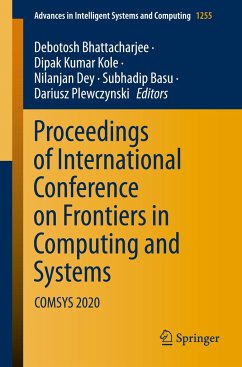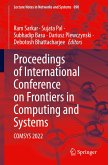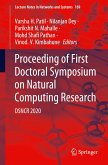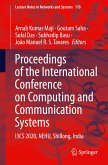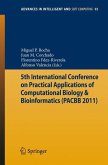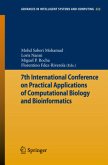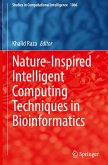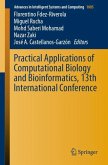Proceedings of International Conference on Frontiers in Computing and Systems
COMSYS 2020
Herausgegeben:Bhattacharjee, Debotosh; Kole, Dipak Kumar; Dey, Nilanjan; Basu, Subhadip; Plewczynski, Dariusz
Proceedings of International Conference on Frontiers in Computing and Systems
COMSYS 2020
Herausgegeben:Bhattacharjee, Debotosh; Kole, Dipak Kumar; Dey, Nilanjan; Basu, Subhadip; Plewczynski, Dariusz
- Broschiertes Buch
- Merkliste
- Auf die Merkliste
- Bewerten Bewerten
- Teilen
- Produkt teilen
- Produkterinnerung
- Produkterinnerung
This book gathers outstanding research papers presented at the International Conference on Frontiers in Computing and Systems (COMSYS 2020), held on January 13-15, 2019 at Jalpaiguri Government Engineering College, West Bengal, India and jointly organized by the Department of Computer Science & Engineering and Department of Electronics & Communication Engineering. The book presents the latest research and results in various fields of machine learning, computational intelligence, VLSI, networks and systems, computational biology, and security, making it a rich source of reference material for academia and industry alike.…mehr
Andere Kunden interessierten sich auch für
![Proceedings of International Conference on Frontiers in Computing and Systems Proceedings of International Conference on Frontiers in Computing and Systems]() Proceedings of International Conference on Frontiers in Computing and Systems177,99 €
Proceedings of International Conference on Frontiers in Computing and Systems177,99 €![Proceeding of First Doctoral Symposium on Natural Computing Research Proceeding of First Doctoral Symposium on Natural Computing Research]() Proceeding of First Doctoral Symposium on Natural Computing Research116,99 €
Proceeding of First Doctoral Symposium on Natural Computing Research116,99 €![Proceedings of the International Conference on Computing and Communication Systems Proceedings of the International Conference on Computing and Communication Systems]() Proceedings of the International Conference on Computing and Communication Systems116,99 €
Proceedings of the International Conference on Computing and Communication Systems116,99 €![5th International Conference on Practical Applications of Computational Biology & Bioinformatics 5th International Conference on Practical Applications of Computational Biology & Bioinformatics]() 5th International Conference on Practical Applications of Computational Biology & Bioinformatics161,99 €
5th International Conference on Practical Applications of Computational Biology & Bioinformatics161,99 €![7th International Conference on Practical Applications of Computational Biology & Bioinformatics 7th International Conference on Practical Applications of Computational Biology & Bioinformatics]() 7th International Conference on Practical Applications of Computational Biology & Bioinformatics116,99 €
7th International Conference on Practical Applications of Computational Biology & Bioinformatics116,99 €![Nature-Inspired Intelligent Computing Techniques in Bioinformatics Nature-Inspired Intelligent Computing Techniques in Bioinformatics]() Nature-Inspired Intelligent Computing Techniques in Bioinformatics139,99 €
Nature-Inspired Intelligent Computing Techniques in Bioinformatics139,99 €![Practical Applications of Computational Biology and Bioinformatics, 13th International Conference Practical Applications of Computational Biology and Bioinformatics, 13th International Conference]() Practical Applications of Computational Biology and Bioinformatics, 13th International Conference77,99 €
Practical Applications of Computational Biology and Bioinformatics, 13th International Conference77,99 €-
-
-
This book gathers outstanding research papers presented at the International Conference on Frontiers in Computing and Systems (COMSYS 2020), held on January 13-15, 2019 at Jalpaiguri Government Engineering College, West Bengal, India and jointly organized by the Department of Computer Science & Engineering and Department of Electronics & Communication Engineering. The book presents the latest research and results in various fields of machine learning, computational intelligence, VLSI, networks and systems, computational biology, and security, making it a rich source of reference material for academia and industry alike.
Produktdetails
- Produktdetails
- Advances in Intelligent Systems and Computing 1255
- Verlag: Springer / Springer Nature Singapore / Springer, Berlin
- Artikelnr. des Verlages: 978-981-15-7833-5
- 1st ed. 2021
- Seitenzahl: 940
- Erscheinungstermin: 24. November 2020
- Englisch
- Abmessung: 235mm x 155mm x 50mm
- Gewicht: 1393g
- ISBN-13: 9789811578335
- ISBN-10: 9811578338
- Artikelnr.: 59954381
- Herstellerkennzeichnung Die Herstellerinformationen sind derzeit nicht verfügbar.
- Advances in Intelligent Systems and Computing 1255
- Verlag: Springer / Springer Nature Singapore / Springer, Berlin
- Artikelnr. des Verlages: 978-981-15-7833-5
- 1st ed. 2021
- Seitenzahl: 940
- Erscheinungstermin: 24. November 2020
- Englisch
- Abmessung: 235mm x 155mm x 50mm
- Gewicht: 1393g
- ISBN-13: 9789811578335
- ISBN-10: 9811578338
- Artikelnr.: 59954381
- Herstellerkennzeichnung Die Herstellerinformationen sind derzeit nicht verfügbar.
Debotosh Bhattacharjee is a Full Professor at the Department of Computer Science & Engineering, Jadavpur University. He has published more than 250 journal articles and holds two US patents. Prof. Bhattacharjee has been granted sponsored projects with total funding of ca. INR 2 Crores. During his postdoctoral research, Dr. Bhattacharjee visited various universities in Europe and the USA. He is a life member of the ISTE and IUPRAI, and a senior member of the IEEE (USA). Dipak K. Kole received his Ph.D. in Engineering from Bengal Engineering & Science University (now the IIEST), Shibpur, India, in 2012. He is currently an Associate Professor at the Department of Computer Science & Engineering, Jalpaiguri Government Engineering College, India. His research interests include the synthesis & testing of reversible circuits, social network analysis, digital watermarking and agricultural engineering. He has published more than 50 articles in journals and conference proceedings. Nilanjan Dey is an Assistant Professor at the Department of IT at Techno International New Town, India, and a Visiting Fellow of the University of Reading, UK. Holding a Ph.D. from Jadavpur University (2015), he is Editor-in-Chief of the International Journal of Ambient Computing and Intelligence, and Series Co-Editor of Springer Tracts in Nature-Inspired Computing. He is also the Indian Ambassador of the IFIP - the Young ICT Group. Subhadip Basu received his Ph.D. from the Computer Science and Engineering Department of Jadavpur University in 2006, and has been working as a Full Professor at said department since 2017. He completed his postdoctoral research at the University of Iowa, USA, and University of Warsaw, Poland. He has also been an Honorary Research Scientist at the Department of Electrical and Computer Engineering, University of Iowa, since 2016. Dr. Basu has published over 200 research articles in the areas of pattern recognition and image processing and has received numerous fellowships and awards, including a DAAD Fellowship from Germany and a 'Research Award' from the UGC, Government of India. He is a senior member of the IEEE and life member of the IUPRAI (IAPR). Dariusz Plewczynski's interests are focused on functional and structural genomics. He is currently involved in several big data projects at three institutes: the Centre of New Technologies at the University of Warsaw (his main affiliation), Jackson Laboratory for Genomic Medicine (an international partner), and the Centre for Innovative Research at the Medical University of Bialystok (UMB). He is also participating in two large consortia projects, namely the 1000 Genomes Project (NIH, USA) and the biophysical modeling of chromatin three-dimensional conformation inside human cells using HiC and ChIA-PET techniques as part of the 4D Nucleome project (NIH, USA).
Chapter 1. HOG and LBP based writer verification.- Chapter 2. Implementation of Real Time Virtual Dressing Room using Microsoft Kinect SDK and Supervised Learning.- Chapter 3. Multiple Radar Data Fusion to Improve the Accuracy in Position Measurement Based on K-means Algorithm.- Chapter 4. A Brief Survey of Steganographic methods for ECG Signal.- Chapter 5. Spectral-spatial active learning in hyperspectral image classification using threshold-free attribute profile.- Chapter 6. A fuzzy logic based crop recommendation system.- Chapter 7. Community Detection and Design of Recommendation System Based on Criminal Incidents.- Chapter 8. Personalized Word Recommendation System using Sentiment Analysis.- Chapter 9. Simulative performance analysis of all optical universal logic TAND gate using Reflective Semiconductor Optical Amplifier (RSOA).- Chapter 10. Development of a Publicly Available Terahertz Video Dataset and a Software Platform for Experimenting with the Intelligent Terahertz VisualSurveillance.- Chapter 11. Identification of Plant Species using Deep Learning.- Chapter 12. A Hybrid Approach for Segmenting Grey and White Matter from Brain Magnetic Resonance Imaging (MRI).- Chapter 13. Retinal Vessel Segmentation using Unsharp Masking and Otsu Thresholding.- Chapter 14. Region Growing Based Scheme for Extraction of Text from Scene Images.- Chapter 15. An Automated Reflector based Traffic Signal System.
Chapter 1. HOG and LBP based writer verification.- Chapter 2. Implementation of Real Time Virtual Dressing Room using Microsoft Kinect SDK and Supervised Learning.- Chapter 3. Multiple Radar Data Fusion to Improve the Accuracy in Position Measurement Based on K-means Algorithm.- Chapter 4. A Brief Survey of Steganographic methods for ECG Signal.- Chapter 5. Spectral-spatial active learning in hyperspectral image classification using threshold-free attribute profile.- Chapter 6. A fuzzy logic based crop recommendation system.- Chapter 7. Community Detection and Design of Recommendation System Based on Criminal Incidents.- Chapter 8. Personalized Word Recommendation System using Sentiment Analysis.- Chapter 9. Simulative performance analysis of all optical universal logic TAND gate using Reflective Semiconductor Optical Amplifier (RSOA).- Chapter 10. Development of a Publicly Available Terahertz Video Dataset and a Software Platform for Experimenting with the Intelligent Terahertz VisualSurveillance.- Chapter 11. Identification of Plant Species using Deep Learning.- Chapter 12. A Hybrid Approach for Segmenting Grey and White Matter from Brain Magnetic Resonance Imaging (MRI).- Chapter 13. Retinal Vessel Segmentation using Unsharp Masking and Otsu Thresholding.- Chapter 14. Region Growing Based Scheme for Extraction of Text from Scene Images.- Chapter 15. An Automated Reflector based Traffic Signal System.

